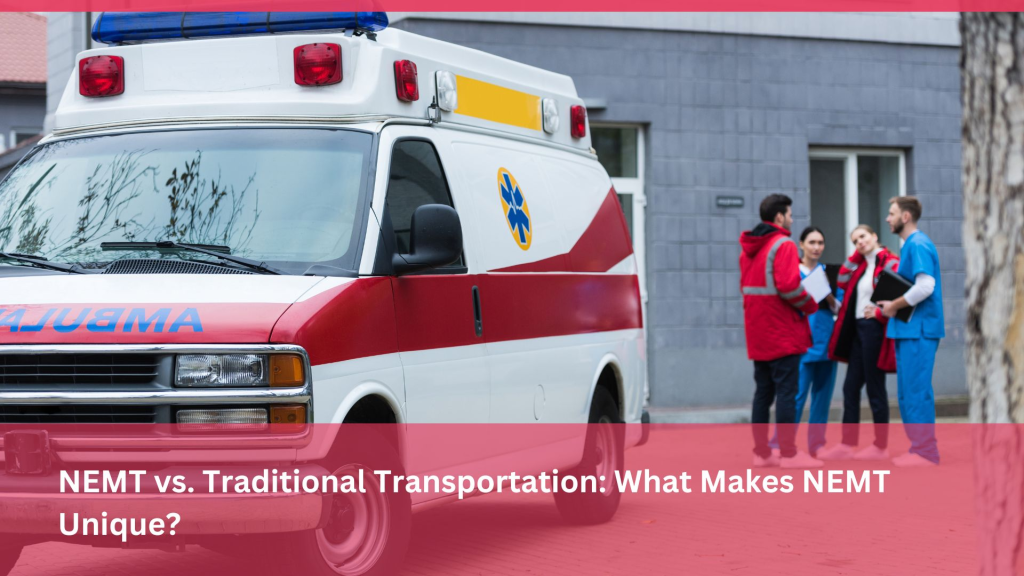New at Safr Care
NEMT vs. Traditional Transportation: What Makes NEMT Unique?

NEMT vs. Traditional Transportation: What Makes NEMT Unique?
When it comes to getting from point A to point B, most people rely on personal vehicles, public transit, or rideshare services. While these options are suitable for many everyday situations, they may not address the specific needs of individuals who require medical care or have limited mobility. Non-Emergency Medical Transportation (NEMT) services offer a specialized solution for patients who need to access healthcare facilities safely, comfortably, and reliably. This article examines the key differences between NEMT and traditional transportation, highlighting what makes NEMT distinct and invaluable.
1. Healthcare Focus and Expertise
The primary purpose of NEMT services is to provide transportation for medical reasons. Unlike traditional transportation methods—such as buses, taxis, or rideshares—NEMT providers are specifically trained to accommodate patients with a variety of health conditions and mobility challenges. This healthcare focus ensures that:
- Medical Knowledge: Drivers and attendants often receive training in patient care, safety protocols, and handling medical equipment.
- Better Communication: NEMT staff understand healthcare terminology, can coordinate with clinics or hospitals, and know how to respond if a patient feels unwell.
- Patient-Centered Experience: Every aspect of the journey is geared toward supporting the patient’s health and comfort.
2. Specialized Vehicle Accommodations
Traditional transportation vehicles, while convenient, are not always equipped to handle wheelchairs, stretchers, or medical devices. NEMT providers invest in vehicles designed or modified to meet these requirements. Depending on the patient’s needs, NEMT fleets may include:
- Wheelchair-Accessible Vans: Equipped with ramps, lifts, and securement systems to ensure a safe and comfortable ride for individuals using wheelchairs or scooters.
- Stretcher Vans: Allowing patients who must remain reclined or lying down during transit to travel securely and comfortably.
- Specialty Vehicles: Outfitted with advanced features, such as oxygen tanks or other medical equipment, for patients requiring more complex care during the journey.
3. Door-to-Door and Hands-On Assistance
While a taxi or rideshare driver will drop you off at a curb, NEMT services typically offer door-to-door or even door-through-door assistance. This means patients receive help not only in entering and exiting the vehicle but also in navigating steps, walkways, and building entrances. Such personalized support is crucial for patients who:
- Have Mobility Limitations: Those who need guidance, stability, or help with walking aids benefit from this level of assistance.
- Are Recovering from Procedures: Patients who may be weak or dizzy after outpatient treatments can rely on NEMT staff to ensure they reach their destination safely.
- Manage Chronic Conditions: Patients with conditions affecting balance, vision, or strength gain independence and confidence knowing help is available.
4. Reliability and Scheduling Flexibility
Traditional transportation options can be unpredictable due to traffic, limited routes, or inflexible schedules. NEMT services strive to minimize these uncertainties by offering:
- Advance Booking: Patients can schedule rides well ahead of medical appointments, ensuring they arrive on time without the stress of last-minute planning.
- Timely Pickups and Drop-offs: NEMT providers understand that punctuality is essential, especially when attending time-sensitive medical procedures or follow-up visits.
- Adaptability: If appointments run late or plans change, NEMT services can often adjust pickup times and routes to accommodate patient needs.
5. Enhanced Safety and Peace of Mind
While traditional transportation methods prioritize getting riders to their destinations, NEMT elevates safety and comfort as top priorities. Patients can rest assured that:
- Trained Professionals: Staff are familiar with medical emergencies, safety restraints, and handling patients with special conditions, reducing the risk of accidents or injuries.
- Strict Hygiene and Sanitation Protocols: Vehicles are cleaned, disinfected, and maintained to higher standards, a consideration especially relevant in a post-pandemic world.
- Reduced Anxiety: Knowing that transportation is tailored to their health needs helps patients feel more at ease and confident in attending medical appointments.
6. Long-Term Health and Cost Benefits
By ensuring patients can access routine screenings, preventive care, and necessary treatments, NEMT services contribute to better health outcomes. This proactive approach often leads to:
- Fewer Missed Appointments: Reliable transport encourages patients to follow through with care plans.
- Early Intervention: Timely medical visits help detect issues before they worsen, reducing emergency room visits and hospital admissions.
- Enhanced Patient Satisfaction: Improved health and consistent care build trust in healthcare systems and lead to greater patient loyalty.
Choosing the Right NEMT Provider
When selecting an NEMT provider, consider factors like reputation, vehicle options, staff training, and the scope of services offered. Companies like SafrCare exemplify the best practices in NEMT, providing compassionate, patient-centered transport solutions that stand apart from traditional transportation options.
Conclusion
NEMT services are far more than just a ride. They represent a patient-focused, medically informed, and accessible option designed to support individuals through their healthcare journeys. Unlike traditional transportation methods, NEMT stands out due to its specialized vehicles, trained professionals, emphasis on safety, flexibility, and compassion.
As healthcare continues to evolve, NEMT services will remain a crucial component in ensuring that no patient is left behind due to mobility challenges, medical conditions, or transportation barriers. By choosing NEMT, patients can embrace a more comfortable, reliable, and empowering approach to accessing the care they need.
